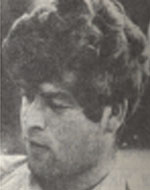Hagai (Condi), son of Esther and Menachem, was born on 24.10.1946 in Jerusalem and completed his elementary studies at the Arlosoroff School in Jerusalem, where he completed his high school studies at Kadouri Agricultural School. Hagai was born in the midst of the battles and assassinations that preceded the War of Independence, and grew up in a house that stood on the border in a divided city that was under tension – and life under these conditions of a besieged settlement increased his love for his people and Jerusalem. In all its corners and environs, and especially liked the old city, for it was not satisfied with the character of the new city, life near the border, during which time He treated them as people like him, not as enemies or enemies, and this sensitivity developed into sensitivity to every person there, and the love and desire for peace were embedded in the blood of the Arabs. Hagai, who took over the youth movement, who took an important place in his world, did not give up on the movement, and remained a member of the movement even after his friends left it. At school, Hagai was quiet, restrained and serious. He had few friends, but with those who had ties he often confessed and was willing to give them his own, and to help them when needed. He was sensitive to justice and integrity, knew how to stand his ground, and formulated his positions in various areas. He spent most of his free time reading. As a child, he had read many encyclopedias and soon became knowledgeable. The older he got, the richer his knowledge became, and the number of books he read was enormous. He read everything that happened to him, and especially he loved literature and professional literature. Though educated and broad-minded, he never tried to emphasize his many knowledge. After completing his elementary studies, he continued his studies at the Kaduri agricultural school, at his explicit demand and as a direct and natural continuation of the movement’s education. There he also got a name that was common to all his friends – Condi. Condi saw Kadouri as an exemplary school that was unmatched, and was full of admiration for the history of the place, its people and its famous spirit. He identified with the ideology of the place, including the negative things, and was ready to fight with his friends against any injustice, real or imagined, that was done to them. Mainly he insisted on justice and integrity. As a student he excelled in humanities, but he also had a desire to succeed in the real professions. He considered literature, history and agriculture more than any other, and was particularly interested in the history of the Yishuv in Israel and in the modern history of the Jewish people. When he began his studies in agriculture, Condi chose Dir, who required special work hours and a lot of investment, out of his love for life and his willingness to invest his entire life in the work. In addition to his work and studies, he did not withdraw from acts of mischief and tension, from many trips and tours in the field, and a deep and active connection with the company. When he was in the twelfth grade, the connection between the cycle of Condi and Kibbutz Malkia was created, and he loved the kibbutz in which he was to build his home, Hagai was drafted into the IDF in late January 1965 and assigned to the Nahal Brigade. In December 1966, he went to Mount Scopus, a carpenter of the mountain, under the guise of a special policeman. The climb to Mount Scopus was a dream come true. As a child he used to see the caravans coming up through his street. Therefore, when he reached the mountain, he learned every path and detail in it, from which he learned to know Jerusalem well. After a while he was sent to officers’ course, but they did not finish. He was sent to Maoz Haim, to command the Nahal Brigade, and was very careful about the soldier’s trainingBut also took care to give them the opportunity to go home on time. He also took care of the nuclear issue socially, not just militarily. In fact, he did not like the army, but he served in it out of recognition, and if they offered him to be released or not to take a commanding officer course, he would not agree, irritating him with most of the military sergeants and symbols, During the Six-Day War, he was confined to his kibbutz, Malkia, but immediately after the war he wanted to return to a reserve unit, fought for it and did not give up, and eventually placed him in a combat company. After his release, Condi returned to Kibbutz Malkia, where he was absorbed and in 1968 married a wife and set up his home there Lived a quiet and simple life, because of his love for animals, he went to work in the cattle industry, where he paid while he was still in Kadouri, and he devoted much effort to establishing the industry, while he was interested in the other branches of the agriculture and social events. During the Yom Kippur War, Condi participated in battles against the Syrians in the Golan Heights, and in the battle that was abandoned east of Mount Yosifon, he was hit by a Katyusha explosion and was killed and brought to rest in the cemetery of Kibbutz Malkia. He left behind a wife and two children – Amos and Zohar, parents and a sister. After his fall, he was promoted to sergeant. Kibbutz Malkia published a memorial booklet in his memory, in which friends and acquaintances from various periods of his life describe his character and his work.
